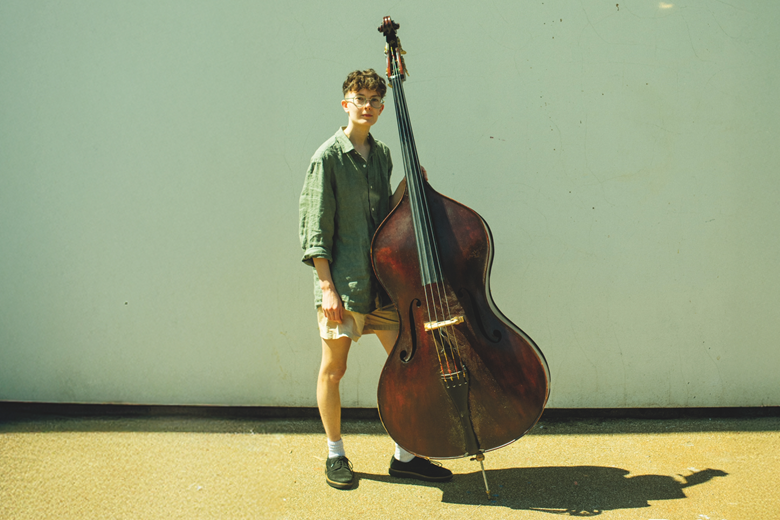Quiet rise of UK jazz's Renaissance woman
Victoria Kingham
Thursday, April 17, 2025
Ursula Harrison won last year’s BBC Young Jazz Musician of the Year, bringing this Welsh native’s talents to wider public attention. Victoria Kingham discovers how the bassist’s blending of genres and extensive studies shape her forward-thinking music

While still at college, Ursula Harrison was the 2024 winner of the BBC Young Musician of the Year prize in the Jazz category. With this accolade she joins a line of young musicians who are now well-established on the British circuit: saxophonist Xhosa Cole, pianist Deschanel Gordon, trumpeter Alexandra Ridout, to name but three. Their own deserved recognition will certainly be shared by Ursula Harrison, a rather reticent, but remarkable, bass player.
She called from Berlin, where she has recently enrolled in a Master’s programme at the famed Jazz Institut. Berlin is well-known for the plethora of European musicians of quality who gravitate there, and it houses a thriving but competitive jazz/improv/free music environment.
Harrison is certain to make great progress there. For a recent music graduate her list of current achievements as a performer is already outstanding. She maintains a busy career, recently performing with her own trio at Ronnie Scott’s, beginning a new duo project with vocalist Sylvie Noble, and recording an album with Welsh folk triple harpist Cerys Hafana, who plays harp like no-one else you’ve ever heard, resolutely developing her own ideas.
And that’s a point of similarity. Harrison’s compositional focus produces ideas as unusual as her accomplished musicality. Coming from a small, but excellent, music scene in Cardiff she is drawn to music which extends boundaries: “trying to combine sound worlds that hadn’t been combined before, or are not usually combined” as she puts it.
It’s a feature of the contemporary music scene that she enjoys: “I think it’s maybe just the way we’re going in general in society, like it’s not so fashionable to do one thing anymore.”
That couldn’t be more true. In this internet-heavy, post-pandemic society it is becoming increasingly difficult, in general, to do just one thing – and the kind of music that young musicians are exploring is a reflection of that.
“Everything you do informs the way that you play,” suggests Harrison. “Just like going for a walk before the performance informs the way that you play. It’s not necessarily a conscious decision.”
Though the BBC prize was for Harrison’s jazz ensemble bass playing, she has released a number of singles and an EP which feature her singing her own lyrics. As a songwriter she is inspired by Grammy-award winning, Americana-infused singer Gillian Welch.
“With Orbit Street” [her current project], she goes on, “we have a process where I write the lyrics and the different parts, but then take it to rehearsals and there are a lot of spaces left open to be decided by what happens in the room and who’s playing. I don’t really like to give people things that are too specific, because I want it to sound like it’s them.”
The idea resonates with that of the best 20th-century jazz musicians, notably of course Miles Davis. His In A Silent Way is an album Harrison used to listen to every night before she went to sleep, and its musical spaciousness, innovative at the time, is now an incorporated feature of many modern compositions.
Harrison grew up in a musical family. Her mother, Paula Gardiner, is also a bass player, and was until recently head of the jazz course at the Royal Welsh College of Music and Drama. She taught Ursula "a little bit" when she was young but Ursula took classical lessons from the age of six. She went, she says, to her mother’s summer schools but did not actually perform with her until adulthood.
She also attended a Welsh comprehensive school noted for its excellence in music and drama. Her educational achievements since then single her out: switching to specialise in jazz bass at age 16, she studied with Yuri Goloubev and Jim Vivian, simultaneously completing a BA in mathematics and music at Cardiff University.
Now in Berlin, she is enrolled in the European Jazz Master’s programme there and is engaged in serious post-graduate study, researching the techniques of composer and theorist Iannis Xenakis and their application to improvised music.
“It’s still in its infancy” she tells me, “I’m just trying out different things at the moment to see what works.”
She admits that it’s hard work to keep the performance development and the study going at the same time but says that she is the kind of person who writes a long to-do list and ticks the tasks off each day.
Asked about her ambitions, Harrison is hesitant: “I think that I just want to be in a position where I can make music that I find interesting with great people. I think that I’m really lucky to be doing that. I just want to continue.”
But obviously, luck has little to do with her cluster of achievements. This modesty, the sensitivity to others’ musicianship, indicates not only her personal character but her bass style: Restrained, but sensitive, and infinitely varied.
This article originally appeared in the May 2025 issue of Jazzwise – Subscribe Today


